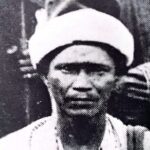MUSHI, a NAMBING
- 3 Min Read
Mushid a Nambing (circa 1856-1907), son of Mwant Yav (Lunda ruler) Mbumb Muteb a Kat (ruled 1874-83) and of Nambing, assumed political prominence after the death of Mwant Yav Mudib in 1885.
Mushid dominated what might be called “the last days of the Lunda empire,” a period characterised by a long succession crisis, Cokwe (Chokwe) incursions from Angola, and the arrival of Congo Free State forces in Uluund (Lunda country). During the confused succession struggles of 1885, the designated Mwant Yav, Samabiamb, who was living in southern Uluund, withdrew from the contest. The weak and indecisive Mwant Yav Mutand Mukay (ruled 1886-87) was then able to hold power for only a short time, as other claimants competed for the Lunda throne.
Among the hopefuls were Mbal a Kalong, son of Mwant Yav Nawej a Ditend, and Mushid a Nambing. When the Chitentam (Lunda council) chose Mbal a Kalong as the next Mwant Yav, Mushid decided to seize power with the help of armed Cokwe traders and slave raiders from Angola. Mwant Yav Mbal a Kalong was eliminated after reigning for two months, and Mushid assumed power in 1887. Mwant Yav Mushid a Nambing established his capital at Kawend on the River Mwema, about 250 km (150 mi) north of modern Dilolo. Then, in 1887, Mushid was attacked by his former Cokwe allies who accused him of not having rewarded them for their help.The battle of Kawend ended with a Cokwe victory, after which their ten year occupation of Uluund (1887-97) began.
Mwant Yav Mushid, with some members of his court, took refuge in the Upper Lubilash region where, together with his brother Kawel or Mulaj, he organised the reconquest of his homeland. In 1896, at Kalambakatshak, on the right bank of the Kasidishi stream, Mwant Yav Mushid received Lieut. Oscar Michaux of the Congo Free State. The two men signed a treaty in which Mwant Yav Mushid recognised the sovereignty of the Free State on condition that the latter would provide him with help in his struggle against the Cokwe.
This collaboration enabled the Lunda to recover part of their territory, and allowed the Free State to establish stations in the area. In 1902 de Clercq founded Kapanga, near the Lunda capital, while in 1903 Verdick founded Dilolo and Katola (the latter being located midway between Dilolo and Kapanga). The demands and exactions of European occupation resulted in strained relations between Mwant Yav Mushid and the Congo Free State agents. Thus, with encouragement from his brother Kawel, Mwant Yav Mushid revolted in 1903. Taking advantage of internal dynastic quarrels, Free State officials then supported Muteb a Kasang, a docile member of the royal family, as Mwant Yav in Mushid’s place. The insurrection soon became a civil war, with the partisans of Mwant Yav Mushid on one side and Muteb a Kasang (who was to be Mwant Yav from 1907-20) and the Free State on the other.
Although, for a time, Mushid and his brother Kawel succeeded in eluding Muteb and his allies, in 1907, they fell into an ambush and were captured. Mushid was made a prisoner, while Kawel, who tried to escape, was killed. Mwant Yav Mushid was later executed. His body, weighted down with a stone tied to the neck, was cast into the Lulua River at the Ibond ford. Because of their courage and determination Mwant Yav Mushid and his brother Kawel, remain symbols of Lunda ethnic pride.
N’DUA SOLOL KANAMPUMB



